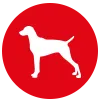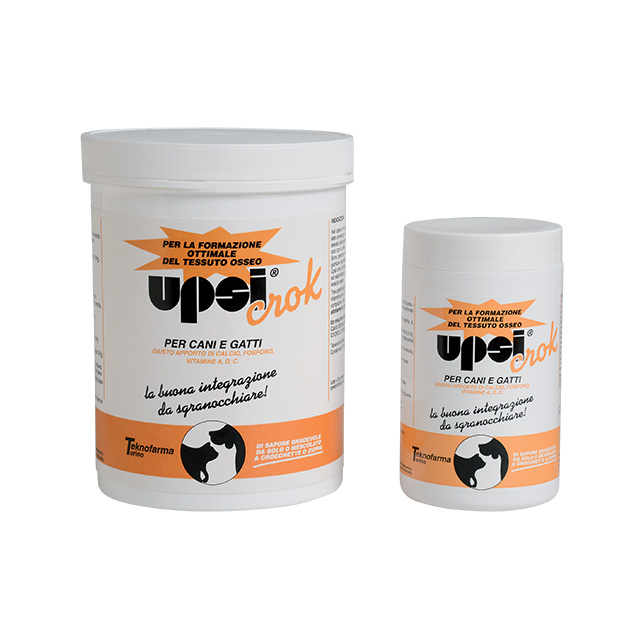ALS:
mineral supplementation for the homemade diet of dogs
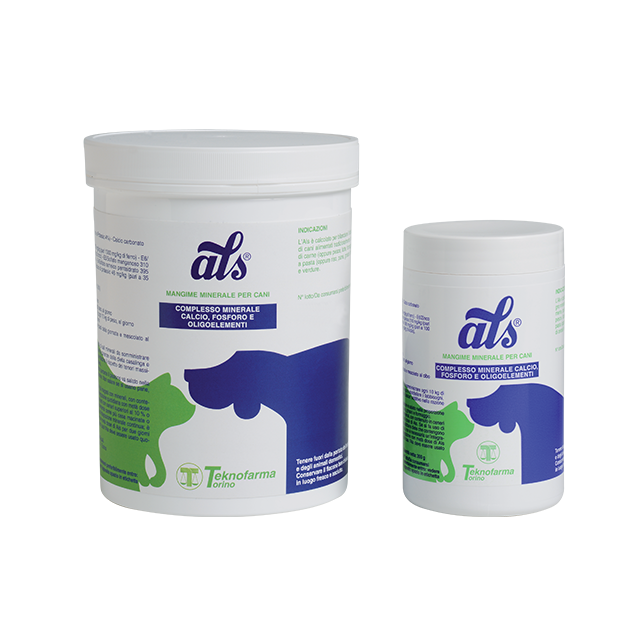
Dogs and cats who are fed a homemade diet always require mineral and vitamin supplementation, which must be appropriate to their food intake. A homemade diet will always be deficient in essential minerals and vitamins, despite the wide variety of ingredients used and even if food is provided in the right quantities.
Precisely for this reason, a homemade diet must be supplemented with one or more complementary feeds for dogs and cats containing minerals and vitamins, specially formulated to ensure a complete and balanced nutrition.
What is ALS?
ALS is a complementary dog feed indicated to supplement and balance the mineral intake in animals who are fed a homemade diet.
WHAT DOES ALS CONTAIN?
ALS provides calcium, phosphorus and trace elements (potassium, iron, zinc, manganese, copper, iodine).
| Calcium |
Calcium is the main component of bones and teeth. In dogs and cats, calcium deficiency may predispose to an increased risk of fractures and lameness, resulting in rickets in puppies and osteomalacia in adults. |
|---|---|
| Phosphorus |
Phosphorus is another essential mineral for the body and, after calcium, is the second largest constituent of bones and teeth. Phosphorus deficiency can cause growth retardation, poor appetite, pica, bone deformities and an increased risk of fractures. |
| Potassium | Potassium is an essential mineral for the body: it is involved in regulating body fluids, muscle contractions and the sending of nerve signals. It is mainly absorbed in the small intestine but may be lost before reaching it when food is cooked or if it is not properly prepared. Potassium deficiency can cause mobility problems. |
| Iron | Iron is the main constituent of haemoglobin, a protein contained in red blood cells that is responsible for transporting oxygen in the blood. Adequate iron levels in the body are crucial for the optimal functioning of the immune system. Iron deficiency in dogs can cause anaemia and a drop in the immune system. |
| Zinc | Zinc is a trace element that is found in numerous enzyme systems (around 70) in the body. It is involved in the complex mechanism of immune defence, the stability of cell membranes, wound repair processes and the absorption of vitamins A and D. Zinc deficiency can lead to structural and functional changes in the heart muscle. In addition, immunodepression, delayed wound healing and reduced resistance to exertion and fatigue may appear. |
| Manganese | Manganese is an essential trace element, as it is involved in many important enzymatic processes in the body. It actively participates in several biological mechanisms: coagulation, thyroid activity, fertility, the immune system, blood sugar regulation, bone formation. Manganese deficiency in animals results in growth retardation in puppies, skeletal deformities, decreased reproductive capacity and defects in the metabolism of carbohydrates and lipids. |
| Copper | Copper is involved in the keratinisation of the hair, the proper functioning of the nervous system, and the formation of blood cells and pigments. ICopper deficiency may cause changes in the skin, hair and muscles as well as liver and skeletal damage. |
| Iodine | In dogs and cats, iodine is an essential mineral for the regular functioning of the thyroid gland. Iodine deficiency can lead to hypothyroidism - a metabolic disease that - due to a malfunction or structural abnormality of the thyroid gland - results in decreased production of thyroid hormones. Reduced resistance to fatigue and exertion, increased sensitivity to cold, constipation, dry skin, weight gain and muscle weakness can also be observed. |
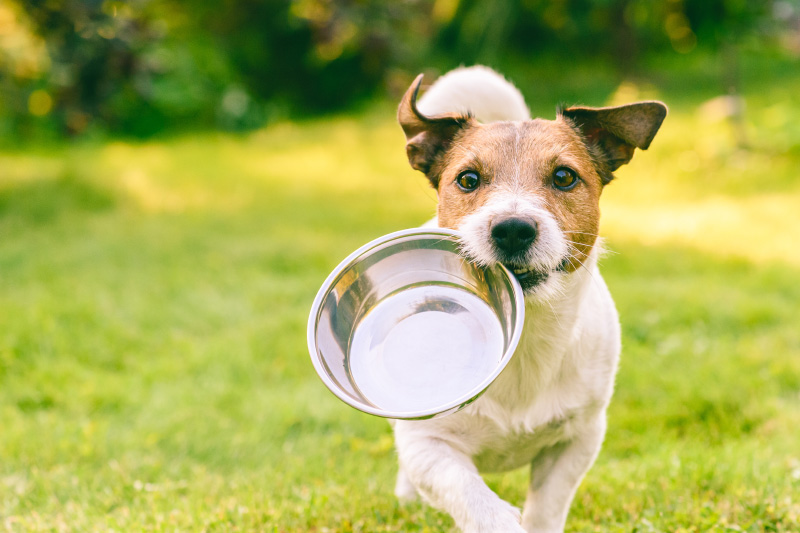
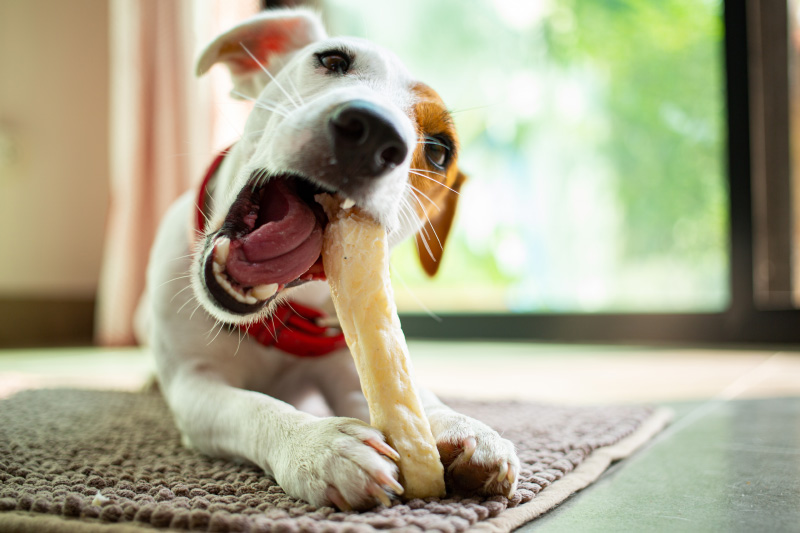
WHEN SHOULD I USE ALS?
ALS is a complementary feed formulated to ensure a balanced mineral intake for dogs that normally follow a homemade diet, based on mixtures of meat (or fish, milk, cheese and soy), pasta (or rice, bread, breadsticks, cereal flakes) and vegetables.
HOW SHOULD I USE ALS?
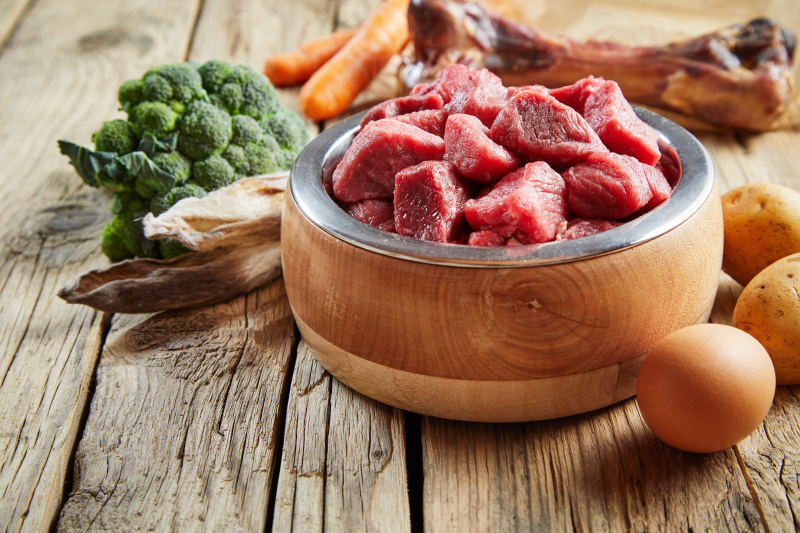
The daily quantity of ALS should be divided over the meals of the day and mixed with the usual food.
Use the measuring cup provided: one heaped measuring cup corresponds to 4 g.
Daily amounts:
- Adult dogs: 4 g per 10 kg bodyweight per day
- Puppies and lactating dogs: 6 g per 10 kg bodyweight per day
- Pregnant dogs (weight at the beginning of the pregnancy): 6 g per 10 kg bodyweight per day
- Older dogs: 2 g per 10 kg bodyweight per day.
These daily amounts provide the necessary minerals per 10 kg of animal weight to compensate for deficiencies in the homemade diet and meet the animal’s needs.
If the dog already eats flakes or feed supplemented with minerals and with an ash content between 2% and 5%, half the recommended amount of daily intake of ASL.
If the dog eats complete feed with an ash content above 10%, or if it follows a diet that usually contains meat and ground bones or meat and bone meal, a continuous supplement of minerals is not necessary. Half the quantity of ALS for two non-consecutive days a week is the recommended and necessary amount.
It is important to emphasise that a homemade diet should never be improvised, but should always be formulated by a veterinary doctor, better still a veterinary nutritionist.
It must be monitored over time and modified according to the animal’s needs.
IN WHICH SIZES IS ALS AVAILABLE?
ASL is available in two packages:
- 200 g jar
- 500 g jar.
WHERE CAN I BUY ALS?
ALS is a complementary feed; it can be purchased in pharmacies, drugstores, pet shops and online on specialised pet product websites.
